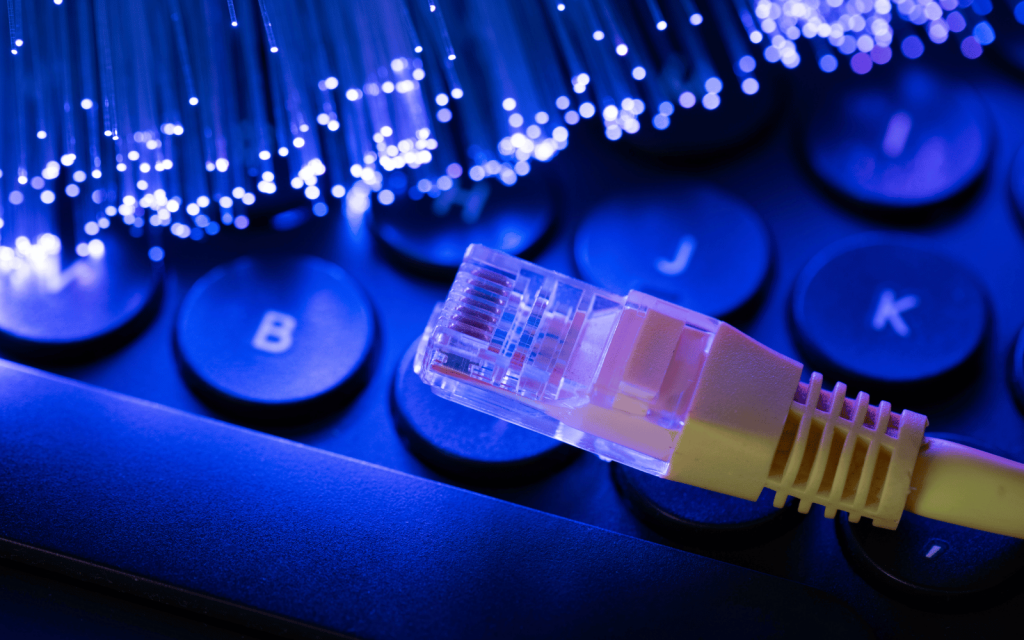When it comes to getting internet into your business, there are really only two technology choices: 5G and fibre. With both promising high-speed connectivity with enough bandwidth that staff won’t feel like their internet is being throttled, it can be a tough choice. Rest assured, though, there are enough differences between the two connection types to warrant some deeper thought before deciding.
Here, we weigh the pros and cons of each to determine which might serve your business best in South Africa’s unique market.
The case for fibre internet

Pros of fibre:
- Consistent speeds: Unlike traditional copper lines, fibre offers consistent high-speed internet that isn’t affected by external conditions like the weather, or how busy the nodes on the network are. This means that during peak times, your business operations won’t be hampered by a sudden slowdown in connectivity. It also means that if you pay for 50Mbps up and 50Mbps down, you will almost always experience your internet at those speeds.
- Symmetrical speeds: Fibre networks offer symmetrical upload and download speeds, so upload and download speeds that are the same (e.g. 10Mbps up/10Mbps down, 50/50, 100/100 etc.); this is good for businesses that rely on cloud services, heavy file uploads, or real-time data backups.
- Reliability: Fibre cables are less susceptible to bad weather and completely resistant to corrosion, translating to lower maintenance and higher uptime for businesses. And of course, they aren’t attractive to thieves as the materials they are made of aren’t valuable so nobody is going to be digging them up to sell to the scrapyard down the road.
- Scalability: With fibre, bandwidth is only limited by the infrastructure’s electronics (and your chosen speed), not the cable itself, allowing for easier upgrades as your business grows.
Cons of fibre:
- Availability: The biggest hurdle for fibre is infrastructure. Despite its popularity, fibre has yet to be rolled out in many South African locales, especially rural areas. This is usually the result of a lack of demand, so there’s little to no chance of recovering the money spent on installation. Fibre companies are businesses, after all, and need to make money from any infrastructure investments they make.
- Installation costs, complexity, and time: Getting fibre installed can take a long time; installers from fibre providers like Vumatel, Frogfoot, DFA etc., need to first come out and install the CPE (Customer Premises Equipment, the fibre box thingy mounted on the wall that a Wi-Fi router plugs in to), and only then can you start the process of organising a fibre account with an Internet Service Provider and getting connected to the internet. After that, if your ISP doesn’t provide you with a WiFi router, you’ll need to get yourself one and then set it up. If they do, you might be in for installation AND hardware costs, which can quickly add up. Check the Ts and Cs of your preferred connection closely before committing.
- Static location: Once installed, fibre connections are fixed in place, offering no flexibility for businesses on the move or those with remote field operations.
The case for 5G
Pros of 5G:
- Speed: In ideal conditions, 5G can outperform fibre speeds, providing lightning-fast internet access.
- Lower latency: 5G wireless connections offer lower latencies than fibre, at least on paper (microwaves travel faster in the air than light does in glass). This is crucial for latency-sensitive applications like remote surgery, real-time analytics, and online games.
Side note: As various external factors play into how a 5G network performs, 5G connections don’t always offer lower latencies than fibre connections. The inherent stability of a fibre connection and less susceptibility to environmental factors means that, on balance, fibre connections offer more reliable low-latency performance than 5G connections do.
- Mobility: 5G is wireless, allowing businesses to stay connected without the constraints of a fixed line. This is ideal for mobile businesses and field workers.
- Ease of deployment: 5G infrastructure can be set up relatively quickly, especially in urban areas, as it doesn’t require extensive cabling.
Cons of 5G:
- Coverage limitations: Currently, 5G is still in its rollout phase and is mostly available in metropolitan areas (where there are more customers likely to sign up). Coverage is sparse in rural regions, as there are fewer businesses there that are likely to sign up for it (and who can afford the monthly costs).
- Cell tower congestion: Each cell tower in any 5G network has limited capacity and can only support so many connections. Naturally, it follows that when those connections are maxed out, they won’t perform as well. That means when everyone in the tower’s coverage area is using the internet at the same time, each individual connection’s speed won’t be great. This isn’t a problem for fibre connections.
- Variable speeds: The speed and quality of 5G can be affected by physical obstacles (buildings, trees, walls, glass windows etc.) and the number of devices connected to the network. So while your 5G connection is theoretically faster than fibre, whether your 5G connection actually performs at those speeds will come down to external factors that you don’t have much control over, like the weather, the number of obstacles in the way, and electromagnetic interference.
- Data caps: One of the biggest differences between 5G connections and fibre, is that 5G connections come with data caps while fibre connections typically don’t. If you use a lot of data every month, topping up your 5G plan is going to be pretty expensive. The only data limit on fibre is up to each ISP’s fair usage policy, which is usually in the hundreds of gigabytes.
Which is best for South African businesses?
Determining the best connectivity option for your business isn’t exactly black and white.
Fibre’s reliability and consistently high speeds are unmatched for businesses that don’t move around, particularly those involved in data-heavy operations like the tech, content creation, and finance sectors. It’s a solid investment for businesses that can afford the initial outlay and are situated in areas where fibre has already been rolled out.
On the other hand, if your area is covered by 5G, it’s a flexible and fast alternative that can connect businesses anywhere and anytime, and all you really need is the 5G modem provided by your ISP. This is particularly appealing for businesses that need to connect to the internet as soon as possible and who can’t afford to wait around for fibre to be installed.
Ultimately, the choice between 5G and fibre will come down to the individual business’s needs, their location, and what they do. It’s also smart to keep in mind where the business is likely to be in 5 to 10 years and plan accordingly.
What do we advise?
So, with all of this information to think about before choosing an internet technology for your business, what do we think you should go for? Here’s our answer:
5G, as much as it’s a cool new(ish) technology with awesome possibilities, is not as reliable as fibre and doesn’t offer uncapped data. That’s why we advise getting a fibre connection if you can and pay for the fastest speed your budget allows. Lastly, don’t forget to also invest in a good-quality Wi-Fi router.
While 5G certainly is an exciting technology, and our inner geeks love the idea of faster-than-fibre connectivity over the air, for business use we advise only connecting via 5G as a failsafe or if fibre isn’t an option in your area. It’ll do the job, but there are better ways.
For a breakdown of the type of connection to go for (a business-specific connection vs. one for home use), you can read what we had to say about it here.
